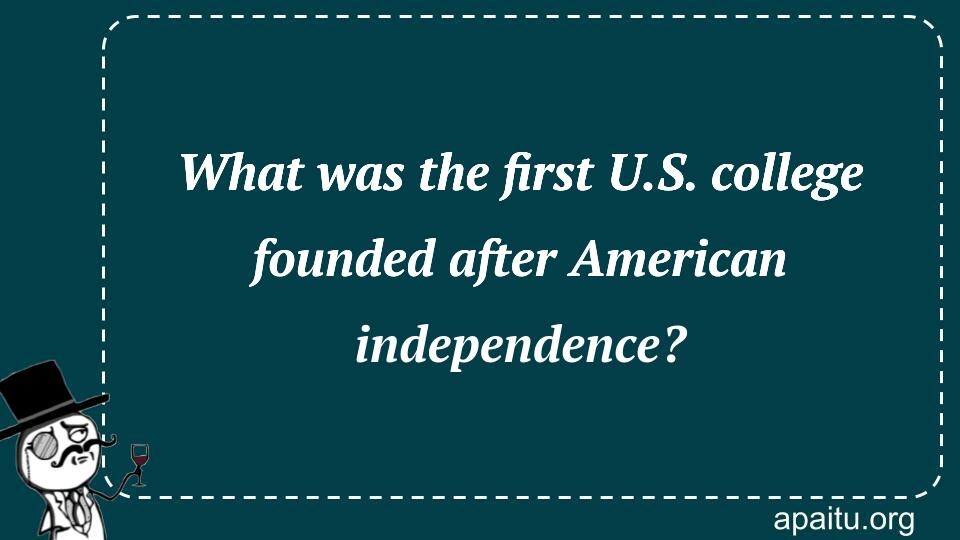Question
Here is the question : WHAT WAS THE FIRST U.S. COLLEGE FOUNDED AFTER AMERICAN INDEPENDENCE?
Option
Here is the option for the question :
- Dickinson College
- Moravian College
- University of Michigan
- Washington and Lee University
The Answer:
And, the answer for the the question is :
Explanation:
Dickinson College was created as the first college chartered in the aftermath of the founding of the new United States in 1783, just a few years after America declared its independence — and days after the Treaty of Paris was signed, ending the Revolutionary War. Benjamin Rush, who also signed the Declaration of Independence, drafted the charter.

Unveiling History: Dickinson College – The First U.S. College Founded After American Independence
In the wake of American independence, a new era of educational institutions emerged, reflecting the spirit of the young nation. Among these pioneering institutions, one stands out as the first U.S. college founded after American independence: Dickinson College. Established in Carlisle, Pennsylvania, in 1783, Dickinson College holds a special place in American higher education, embodying the ideals of intellectual freedom, civic engagement, and the pursuit of knowledge. In this article, we will explore the history of Dickinson College, its founding principles, and its enduring legacy as a trailblazer in American academia.
The origins of Dickinson College can be traced back to the aftermath of the American Revolution. As the country sought to rebuild and establish its identity, there was a growing recognition of the need for institutions of higher learning. In this context, Benjamin Rush, a prominent physician, educator, and signer of the Declaration of Independence, played a pivotal role in the founding of Dickinson College. Inspired by the Enlightenment ideals of education and the pursuit of truth, Rush envisioned a college that would provide a liberal arts education grounded in reason, virtue, and civic responsibility.
In 1783, Rush’s vision became a reality when Dickinson College was officially chartered. The college was named in honor of John Dickinson, a Founding Father and signer of the Constitution, who was known for his advocacy of American independence. From its inception, Dickinson College sought to provide a comprehensive education that combined the liberal arts with a focus on practical skills and civic engagement. The college aimed to produce well-rounded individuals who would contribute to the betterment of society and the preservation of democratic principles.
In its early years, Dickinson College faced numerous challenges, including financial difficulties and the need to establish a reputation in a competitive educational landscape. However, the college persevered, driven by its commitment to academic excellence and its dedication to fostering a community of intellectual inquiry. Despite its humble beginnings, Dickinson College soon attracted notable faculty members and distinguished students, solidifying its position as a respected institution of higher learning.
Throughout its history, Dickinson College has been at the forefront of educational innovation and social progress. It was one of the first colleges in the United States to admit women, with the enrollment of its first female students in 1884. The college also played a significant role in the abolitionist movement, hosting lectures and debates on the issue of slavery. The commitment to social justice and civic engagement has remained a defining characteristic of Dickinson College, inspiring generations of students to become agents of positive change in their communities.
Dickinson College continues to uphold its founding principles while adapting to the challenges of the modern world. The college offers a diverse range of academic programs, spanning the humanities, social sciences, natural sciences, and pre-professional fields. It emphasizes interdisciplinary learning, global engagement, and experiential education, providing students with the tools and knowledge necessary to navigate a rapidly changing society.
The campus of Dickinson College, with its historic buildings and picturesque surroundings, serves as a testament to the institution’s rich heritage and enduring legacy. The college community, composed of students, faculty, and staff, is united by a shared commitment to intellectual curiosity, critical thinking, and active citizenship. Through its rigorous academic programs, vibrant campus life, and dedication to community engagement, Dickinson College continues to shape the minds and lives of its students, preparing them to become leaders and change-makers in the world.
Dickinson College holds the distinction of being the first U.S. college founded after American independence. With its founding principles rooted in the ideals of intellectual freedom, civic engagement, and the pursuit of knowledge, Dickinson College has played a pivotal role in American higher education. It remains a beacon of academic excellence and a testament to the transformative power of education. As Dickinson College looks to the future, it will undoubtedly continue to inspire and empower generations of students to make a meaningful impact on society and shape a better world.